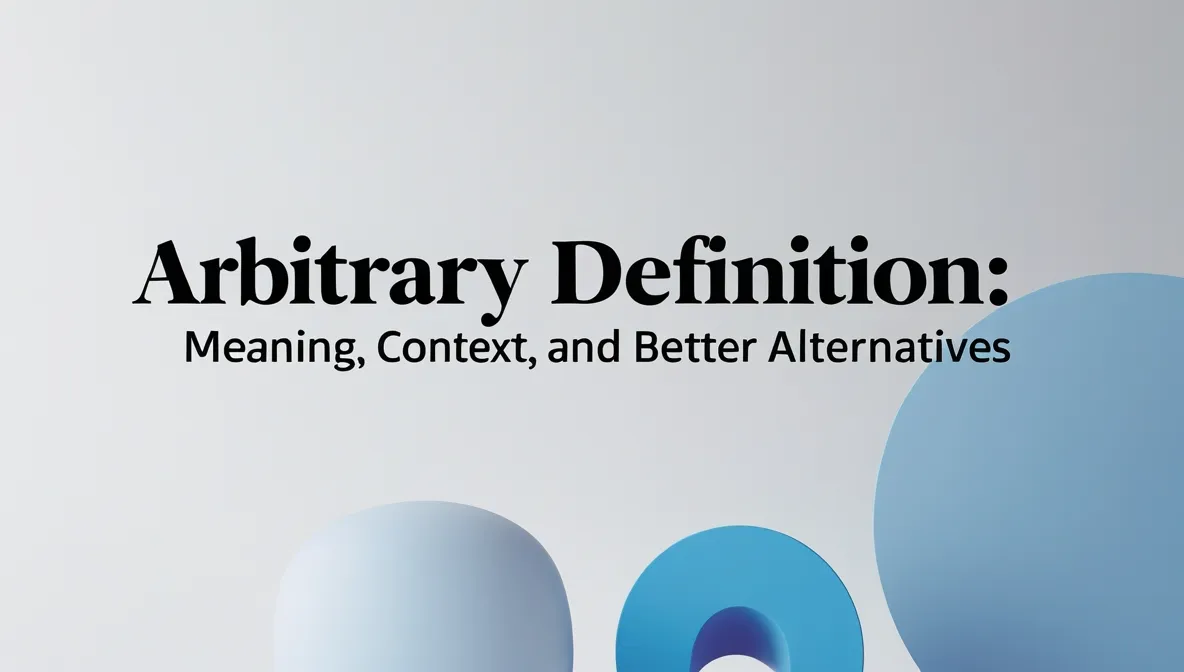On this special anniversary of ideas, let’s celebrate the bond between friendship, love, and curiosity. Just as in enduring relationships we cherish trust, respect, and gentle understanding, so too in language we nurture clarity, empathy, and resonance. Today we embark on a journey through the concept of “arbitrary,” weaving together emotional warmth and intellectual clarity, much like the vows between companions who support and uplift one another. Let’s explore the meaning, usage, and richer alternatives to “arbitrary,” holding each idea as we would a cherished memory. Arbitrary Definition: Meaning, Context, and Better Alternatives
Words carry power. When we use a term like arbitrary, we affect how others perceive our intentions. In close conversations — with friends, loved ones, or colleagues — speaking with clarity and care strengthens connection. Through this article, we aim to define arbitrary, examine its context, understand when it works (and when it doesn’t), and discover more meaningful substitutes. I invite you to read with the same warmth you feel when someone says I’m here for you. Let’s begin.
Understanding the Term Arbitrary in Depth
- The arbitrary definition speaks to decisions made without logical pattern or system 🤔
- It carries a sense of randomness or whimsy in how rules or choices arise 🎲
- We often use arbitrary to describe actions that seem capricious or uncontrolled 🌪
- In everyday life arbitrary decisions feel unpredictable or unjust 🔄
- A formal definition sees arbitrary as lacking a necessary basis or standard ⚖️
- The idea conveys selection by personal whim rather than reason 🌀
- In logic or philosophy, arbitrary implies no inherent necessity 🔍
- In grammar or language, arbitrary signs lack intuitive connection to meaning 📚
- In mathematics, arbitrary may denote any element satisfying given conditions ∀
- In computer science, arbitrary choices often break ties or default settings 💻
- In law, arbitrary actions often violate fairness or reasonableness 🏛
- In art, arbitrary choices can lend freedom or eccentricity 🎨
- In psychology, arbitrary thoughts feel spontaneous or disconnected 🧠
- In ethics, arbitrary judgments seem unfair or discriminatory ⚖️
- In love and friendship, anything arbitrary feels unpredictable and uneasy 💞
Understanding arbitrary helps us see its power and its pitfalls. In the next sections, we explore its connotations, applications, and how we can lean toward more grounded alternatives.
Exploring What Arbitrary Connotes
- Arbitrary often connotes randomness without justification ✨
- It suggests a lack of transparent reasoning behind choices 🔍
- It evokes feelings of unfairness or unpredictability ⚖️
- It may hint at capriciousness or whim 🌬
- It evokes an absence of standard or guiding principle 🌈
- It resonates with notions of force without reason 💥
- It can carry a negative tone when authority acts arbitrarily 🚫
- It may feel cold or uncaring in personal contexts 💔
- It suggests decisions without accountability or logic 🧾
- It signals reliance on individual whim over consistency 🛤
- It may imply superficiality or shallow rationale 🎭
- It can provoke distrust when used of someone’s motives 🕵️
- It stands in contrast to reasoned, principled, structured choice 🧩
- It resonates with unpredictability and chaos 🌌
- It pushes us to ask, Why this and not that? 🤷
When the Word Arbitrary Appears in Context
- Legal rulings may be called arbitrary when lacking clear basis ⚖️
- Workplace policies become arbitrary when rules lack coherence 🏢
- In school grading, arbitrary scores feel unfair to students 🏫
- In algorithm design, arbitrary tie‑breakers decide outcomes 💻
- In storytelling, arbitrary plot twists weaken reader trust 📖
- In interpersonal dynamics, arbitrary decisions cause friction 💥
- In creative expression, arbitrary choices may feel adventurous 🎨
- In governance, arbitrary rule erodes faith in authority 🏛
- In scientific modeling, arbitrary parameters reduce predictive power 🧪
- In data analysis, arbitrary thresholds introduce bias 📊
- In scheduling, arbitrary deadlines overwhelm people’s routines ⏰
- In personal preferences, arbitrary rules feel stifling or odd 🎯
- In relationships, arbitrary demands strain mutual respect 💏
- In policy making, arbitrary legislation invites challenges 🧾
- In ethics, arbitrary standards betray principles of fairness ⚖️
Whenever arbitrary surfaces, we must ask: is there a stronger, more transparent alternative?
Arbitrary Definition: Meaning, Context, and Better Alternatives
Why Relying on Arbitrary Decisions Can Backfire
- Arbitrary choices breed confusion in teams or groups 🌀
- They erode trust when people see no logic behind rules 💔
- They feel unfair, making some feel targeted or ignored 🧍
- They lead to inconsistency, with different rules for different people 🔄
- They invite resentment from those affected 😠
- They reduce predictability, increasing anxiety 🎢
- They make accountability impossible to assess 🔍
- They discourage open dialogue or feedback 🤐
- They often mask bias, conscious or unconscious 🧠
- They limit learning and growth, as errors go unexplained 📈
- They hinder team cohesion and morale 🤝
- They weaken your ability to defend decisions rationally 🛡
- They discourage ownership, leaving people feeling powerless 🚷
- They undercut credibility in leadership or voice 🗣
- They block progress, because rationale is never shared 🛑
If we avoid arbitrary structures, we can build trust, clarity, and strength in relationships and systems.
Grasping Meaning via Synonyms and Related Terms
- Synonyms like capricious, random, whimsical, and undetermined link to arbitrary 🌈
- Capricious suggests whimsical, unpredictable mood swings 🌬
- Random conveys lack of pattern or plan 🎲
- Whimsical adds a playful, fanciful nuance 🎭
- Undetermined signals absence of fixed value or choice ❓
- Unsystematic implies lack of order or structure 🧱
- Haphazard suggests chaotic, scatter‑shot choices 🌀
- Unprincipled hints at absence of guiding ethics 🚫
- Unjustified denotes lack of valid defense or reason 🧾
- Eccentric implies odd but possibly intentional choice 🎩
- Stochastic (in math) means governed by probability 📐
- Arbitrary vs. deliberate contrasts rash with intentional 🔄
- Subjective choices may border on arbitrary in absence of rationale 🧠
- Indiscriminate actions may feel arbitrary in impact 🎯
- Chance‑based decisions carry arbitrary flavor 🎰
Using these terms helps us nuance meaning rather than relying on one overloaded word.
Tracing the Roots: History and Philosophy of Arbitrary
- Philosophers debated arbitrary in connection with free will 🧠
- Early thinkers pondered whether any choice can be fully arbitrary 🔄
- Kant introduced the idea of reason limiting arbitrary impulse 🧩
- In legal philosophy, arbitrary power refers to rulership without law 👑
- Social contract theorists decried arbitrary authority over citizens 🏛
- In semiotics, Saussure noted arbitrary nature of signs (word‑meaning link) 📚
- In mathematics, the word arbitrary denotes any chosen element ∀
- In logic, arbitrary constants represent general placeholders 🧮
- In political theory, arbitrary rule opposes the rule of law ⚖️
- In linguistics, arbitrariness draws the gap between sign and referent 📢
- In ethics, arbitrary standards violate universal justice 🌐
- In aesthetics, arbitrariness sometimes celebrates spontaneity 🎨
- In psychology, arbitrary thought tying to randomness of mind 🧠
- In theology, debates about God’s nature and arbitrary decree arise 🙏
- Through centuries, the tension between arbitrariness and reason persists ⏳
Understanding the intellectual lineage helps us grasp both strengths and critiques of arbitrary notions.
Arbitrary Definition: Meaning, Context, and Better Alternatives
When Arbitrary Works: Beneficial Uses
- In creativity, arbitrary choices spark novel inspiration 🎨
- In brainstorming, arbitrary constraints generate fresh ideas 💡
- In art, arbitrary form can defy conventions and surprise 🎭
- In improvisation, arbitrary movement leads to spontaneity 🎷
- In testing, random (arbitrary) sampling can ensure fairness in studies 📊
- In games, arbitrary rules can add unpredictability and fun 🎲
- In writing prompts, arbitrary elements spark imagination 📓
- In exploratory research, arbitrary assumptions may start hypotheses 🔍
- In parody or absurdism, arbitrary logic foregrounds humor 😆
- In flexible scheduling, arbitrary breaks may relieve stress ☀️
- In free play for children, arbitrary rules boost creativity 🧸
- In poetic devices, arbitrary imagery evokes surprise 🌙
- In debugging, arbitrary resets help isolate issues 🛠
- In simulations, arbitrary seeds may test robustness 🌱
- In rules for games, arbitrary tie-breakers complete structure ✳️
Used consciously and transparently, arbitrary may fuel possibility without chaos.
When It Fails: Dangers of Being Arbitrary
- In leadership, arbitrary decisions feel unfair and undermine authority 🏛
- In law, arbitrary rulings violate principles of justice ⚖️
- In education, arbitrary grading erodes student trust 🎓
- In performance evaluation, arbitrary metrics frustrate staff 📈
- In contracts, arbitrary terms breed conflict and litigation 📝
- In relationships, arbitrary demands feel controlling or capricious 💔
- In policy, arbitrary regulations harm legitimacy 🌆
- In AI, arbitrary weight assignments reduce model transparency 🤖
- In funding, arbitrary allocations provoke accusations of bias 💵
- In standards, arbitrary cutoffs exclude deserving participants 🚫
- In healthcare, arbitrary protocols compromise patient trust 🏥
- In safety rules, arbitrary thresholds may risk harm 🚨
- In resource management, arbitrary decisions cause wastage 💧
- In organizational culture, arbitrary rules breed resentment 🧱
- In reputation, arbitrary behavior erodes credibility 🌪
To prevent failure, we should lean toward reasoned, consistent, explainable alternatives.
Contextualizing Arbitrary in Communication
- In conversation, calling something arbitrary may feel harsh or dismissive 💬
- In writing, you may qualify arbitrary to soften the tone, e.g. somewhat arbitrary ✏️
- In feedback, labeling a rule arbitrary without explanation stings 🛠
- In persuasion, relying on arbitrary claims weakens your argument 📉
- In academic writing, arbitrary assumptions must be justified or avoided 📚
- In contracts or policy, arbitrary clauses invite scrutiny and challenge 🏛
- In leadership speech, arbitrary decisions demand careful framing 🗣
- In negotiation, opposing arbitrary offers strengthens your stand 🔄
- In philosophy, recognizing arbitrary presuppositions reveals deeper structure 🧠
- In debate, calling opponents arbitrary undermines their credibility 🥊
- In branding, arbitrary design choices risk confusing customers 🎨
- In social media, arbitrary rules may spark backlash instantly 🌐
- In humor, calling something arbitrary can amuse or alienate 🤡
- In therapy, labeling feelings arbitrary may dismiss emotional depth 💖
- In storytelling, arbitrary twists must still feel grounded to satisfy readers 📖
Always aim to couple mentions of arbitrary with rationale, empathy, or invitation to dialogue.
Arbitrary Definition: Meaning, Context, and Better Alternatives
Practical Alternatives to Arbitrary Choices
- Use deliberate to emphasize thoughtful intention 🎯
- Use intentional when actions align with specific aims 🎯
- Use reasoned to highlight basis in logic or evidence 📊
- Use principled to show grounding in ethics or values ⚖️
- Use systematic to describe structured, orderly approach 🛠
- Use consistent to stress stable, repeatable pattern 🔄
- Use justified to underscore fair, supportable basis 🧾
- Use rational when grounded in logic and reasoning 🧠
- Use purposeful to stress aim or goal behind choice 🎯
- Use methodical when following a well‑defined method 🧰
- Use calculated to show analysis and forecast 📈
- Use explicit to clarify assumptions and avoid ambiguity ✏️
- Use grounded to anchor decisions in reality 🌱
- Use measured to imply careful moderation ⚖️
- Use transparent to assure openness and explainability 🌟
By selecting one of these alternatives instead of arbitrary, you signal clarity, fairness, and respect.
How to Replace Arbitrary in Speech & Writing
- When you hear arbitrary, pause and ask “why?” before using it 🤔
- Replace “arbitrary rule” with “reasoned rule” plus explanation 📖
- Use “intentional decision” instead of “arbitrary choice” 🎯
- Say “grounded standard” rather than “arbitrary standard” 🏛
- Choose “deliberate method” over “arbitrary method” 🧰
- In dialogue, replace “You’re being arbitrary” with “I don’t see the logic behind that” 🤝
- Instead of “arbitrary deadline,” say “deadline based on resource needs” ⏰
- Swap “arbitrary allocation” for “allocation based on needs and data” 📊
- Use “justified cutoff” not “arbitrary cutoff” in scoring systems 🏅
- In policies, phrase “criteria explained” not “no arbitrary decision” 🏛
- Substitute “rational basis” for “arbitrary basis” in legal text 🧩
- Use “methodical approach” instead of “arbitrary approach” 🛠
- Replace “arbitrary preference” with “preference informed by values” 💖
- Use “consistent standard” instead of “arbitrary standard” 🔄
- In emotional conversation, avoid calling someone’s feelings arbitrary — ask for their reason 🔍
These swaps improve tone, reduce conflict, and enhance clarity.
Examples: Choosing Better Than Arbitrary
- Rather than choosing meeting times arbitrarily, ask when others are free 🗓
- Instead of giving arbitrary bonus, base it on performance metrics 📈
- Rather than arbitrary grading, use rubrics and criteria 🏫
- Rather than arbitrary seating, assign by alphabetical or team order 🔤
- Instead of arbitrary wage increases, tie them to responsibility or merit 💼
- Rather than arbitrary deadlines, agree realistic ones with stakeholders ⏳
- Instead of arbitrary rules in games, clarify objectives and boundaries 🎯
- Rather than arbitrary chores, distribute tasks by capability and schedule 🧺
- Instead of arbitrary schedule changes, communicate and justify them 🗓
- Instead of arbitrary fashion choices, pick colors and styles based on preference 🎨
- Rather than arbitrary promotions, establish transparent pathways 📈
- Instead of arbitrary project selection, use evaluation criteria 📝
- Rather than arbitrary roles in teamwork, assign based on strength and interest 🤝
- Rather than arbitrary punishments, enforce consequences tied to behavior 🛡
- Instead of arbitrary resource distribution, allocate by need or fairness 💧
These real‑life alternatives promote fairness, clarity, and dignity.
Arbitrary Definition: Meaning, Context, and Better Alternatives
LSI and Semantic Related Notions to Explore
- Free will vs. determinism stand behind arbitrariness debates ⚖️
- Randomness and probability link to arbitrary in math and science 🎲
- Whim and caprice capture the emotional side of arbitrary 🌬
- Vagueness versus precision contrasts arbitrary with clear definitions 🔍
- Bias and discrimination often hide behind arbitrary choices 🎭
- Reason and logic oppose arbitrary decision making 🧠
- Standards and criteria offer alternatives to arbitrary rules 🧾
- Transparency and accountability counter arbitrariness 🌟
- Flexibility and adaptability sometimes require “arbitrary” leeway 🌀
- Subjectivity and objectivity relate to arbitrary claims 🧩
- Chaos versus order symbolize arbitrary vs structured paradigms 🌌
- Autonomy sometimes demands arbitrary acts for freedom 🕊
- Authority and legitimacy depend on non‑arbitrary rule 🏛
- Heuristics may introduce pseudo‑arbitrary shortcuts in thinking ⚙️
- Default settings often act as arbitrary starting points 🖥
- Parameters and boundaries anchor choices beyond arbitrary edges 🛑
Seeing these related ideas deepens your understanding of how arbitrary weaves into many domains.
Strategies to Avoid Arbitrary Tendencies
- Always explain your reasons when making decisions 🧠
- Establish criteria or standards before applying choices 🧩
- Use data and evidence instead of intuition alone 📊
- Seek feedback and involve stakeholders in decision making 🤝
- Review past arbitrary decisions and reflect on outcomes 🔍
- Document processes to maintain consistency and transparency 📋
- Train teams to question decisions respectfully 💬
- Use checklists or rubrics to guide choices 🛠
- Set guardrails or boundaries to reduce whimsy 🚧
- Revisit decisions and revise when needed 🔄
- Encourage open dialogue about why decisions exist 🗣
- Prioritize fairness, equity, and logic over convenience ⚖️
- Model nonarbitrary behavior to build culture 🌱
- Accept that not all decisions need deep justification, but acknowledge that choice ☀️
- Always strive for clarity, empathy, and accountability in decision frameworks ✨
With these strategies, you can reduce arbitrary impulses and foster trust.
Transforming Communication by Reducing Arbitrary
- In emails, add a line: Here’s how I decided instead of leaving it vague 📧
- In meetings, state decision rationale before stating the result 🗓
- In assignments, publish criteria rather than random expectations 📝
- In policies, include footnotes or rationale sections 🏛
- In feedback, say: Because you met X, I granted Y rather than just because 🎯
- In personal life, when you ask a friend to do something, explain why 👫
- In public instructions, avoid “rules for no reason” tones 📢
- In proposals, show rating or scoring rubrics, not arbitrary picks 📌
- In leadership, welcome questions about how decisions arise 🏛
- In coaching or mentoring, share your decision matrix 🧠
- In contracts, reference criteria or benchmarking instead of vague language 📑
- In branding, justify your design or tone choices for consistency 🎨
- In writing, preface statements with rationale to avoid seeming arbitrary 📚
- In public forums, invite input on guidelines rather than imposing them 🌐
- In family life, when distributing chores or privileges, explain your logic 🏡
These small shifts transform how people perceive decisions — from cold and random to fair and respectful.
Arbitrary Definition: Meaning, Context, and Better Alternatives
Measuring Fairness: Metrics Beyond Arbitrary
- Equity ensures distribution based on need, not arbitrary decides ⚖️
- Consistency tracks whether decisions follow the same rules over time 🔁
- Transparency means others can see and understand the rationale 🪞
- Inclusiveness ensures diverse voices avoid arbitrary exclusion 🌍
- Accountability holds decision‑makers responsible for outcomes 🏛
- Feedback loops let people challenge or refine decisions 🗣
- Benchmarking provides external comparison, reducing whims 📈
- Scoring systems break choices into measurable parts 🧮
- Weighted criteria reduce oversimplified arbitrary picks 🎚
- Audits and reviews catch arbitrary decisions retrospectively 🔍
- Standards and norms anchor choices in shared values 🧭
- Ethical frameworks guide beyond random impulses 🌱
- Data‑driven models ground decisions in facts 📊
- Iterative refinement corrects arbitrary elements over time 🔄
- Transparency reporting communicates how and why decisions arise 📎
These metrics let you replace arbitrary with fairness and clarity.
Language Tips to Write About Arbitrary Thoughtfully
- Use qualifiers like somewhat arbitrary or seemingly arbitrary to soften tone 🖋
- Introduce context before calling something arbitrary 🧭
- Follow arbitrary with explanation or justification 📜
- Avoid abrupt labeling of people’s motives as arbitrary 💖
- Use alternatives (intentional, reasoned) to avoid overusing arbitrary ✍
- When you must use arbitrary, frame it as provisional or open to revision ♻️
- Use rhetorical questions: Why arbitrary? to invite reflection 🤔
- Use metaphors: arbitrary as a random drift to clarify meaning 🌬
- Use contrast: not arbitrary, but deliberate to emphasize thoughtfulness 🔁
- Use stories or examples to ground arbitrary decisions in human terms 📚
- Invite dialogue: Let’s not be arbitrary — let me explain 🗣
- Place arbitrary in parentheses or asides when it’s not central 🌱
- Vary synonyms to reduce repetition (capricious, whimsical, random) 🌀
- When critiquing arbitrary, pair it with emotional language (hurt, unfair) 💔
- Use inclusive language: “we” question when we act arbitrarily together 🤝
These tips help you use the term with care and clarity, making readers feel respected.
Real-Life Case Studies: Arbitrary in Action
- A company sets pay raises arbitrarily, leading employees to feel undervalued 💼
- A school imposes random exam weights, causing confusion among students 🏫
- A city government applies zoning rules arbitrarily, sparking lawsuits 🏛
- A manager assigns projects with no clear logic, demotivating team members 🧑💼
- A landlord enforces arbitrary fines, straining tenant relations 🏠
- A club applies membership rules inconsistently, alienating members 🏘
- A government picks grant recipients without criteria, provoking accusations 🎓
- A parent gives privileges arbitrarily, confusing children 🧒
- A university admits students use opaque, arbitrary standards 🎓
- A tech firm picks feature roadmaps arbitrarily, introducing chaos 🚀
- A judge issues arbitrary sentencing, invoking appeals ⚖️
- A publisher accepts manuscripts arbitrarily, discouraging authors 📚
- A nonprofit distributes funds arbitrarily, harming trust in mission 💖
- A coach selects team roles arbitrarily, creating conflict on the roster 🏅
- An editor censors pieces arbitrarily, stifling voice 🗞
Each case shows how arbitrary decisions hurt relationships, trust, and fairness. In contrast, reasoned transparency heals them.
Arbitrary Definition: Meaning, Context, and Better Alternatives
Integrating Better Decision Frameworks in Everyday Life
- Before deciding, list possible criteria or goals you care about 🎯
- Ask Which option aligns best with these criteria? instead of choosing randomly 🔍
- Rate each option numerically rather than by impulse 📊
- Share your reasoning with involved people to build trust 🤝
- Invite questions and be willing to revise as new info emerges 🔄
- Document your decisions so you can revisit and refine them 📝
- Use decision trees or flowcharts to reduce whimsy 🌳
- If you must pick arbitrarily (due to time), mark it provisional and revisit later ⏱
- Use tools (spreadsheets, scoring apps) instead of relying solely on gut feeling 📱
- In groups, define decision rules together ahead of time 👫
- Reflect on past arbitrary choices and learn their costs 🧠
- Allocate buffer time to prevent snap arbitrary decisions ⏳
- Train yourself to pause before acting on whim 🌿
- Celebrate when choices align with fairness and transparency 🎉
- Commit to continuous growth: fewer arbitrary acts over time 🌱
By embedding structures, you gift yourself and others with clarity, dignity, and connection.
Conclusion: From Arbitrary to Intention
In friendship, love, and thought, we long to feel seen, understood, and respected. Using terms like arbitrary without care may convey distance or disregard—even when unintentional. But when we choose to replace arbitrary with deliberate, reasoned, or transparent alternatives, we build stronger connections. Across fields—communication, governance, relationships, writing—moving beyond arbitrary choices fosters trust, fairness, and clarity.
May your decisions feel like promises kept rather than mysteries withheld. May your words serve not to confuse but to illuminate. And may the shared life of ideas between us grow richer, more cogent, and more compassionate with each day.
Frequently Asked Questions
Q: What exactly does arbitrary mean in everyday speech? A: In everyday speech, arbitrary means a choice or decision made without a clear rule or reason, often appearing random or capricious.
Q: Is using arbitrary always negative? A: No — in creative, exploratory, or playful settings, an arbitrary choice can spark novelty. The key is awareness and context.
Q: How do I know when a decision feels too arbitrary? A: If others ask Why this and not that? or you can’t state a reason, chances are your decision feels too arbitrary.
Q: Can I combine arbitrary and reasoned choices in one system? A: Yes — you might use structured rules for core decisions and allow occasional arbitrary (but flagged) flexibility.Q: What is the first step to avoid arbitrary bias in my workflow? A: Begin by writing down your decision criteria ahead of time and compare every choice against them.
Arbitrary Definition: Meaning, Context, and Better Alternatives
















